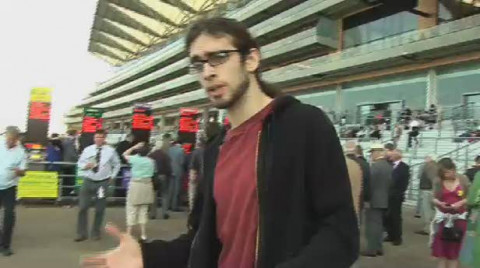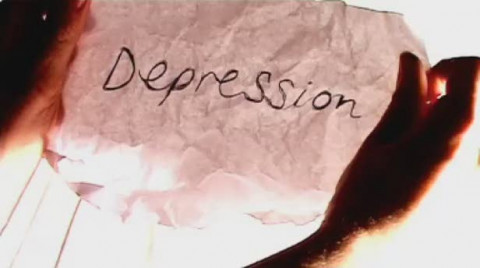To Life
Tanwen I forgot to check if I had stuff in my teeth.
Director You don't.
Tanwen This shirt, by the way, it's got the worst buttons ever, ever buttoned. So, and, hello,, that's amazing. That is really clever. So you can't see a lens? Yeah, but your head is now in the wrong place to your body, but that's fine.
Director You're not religious, are you?
Tanwen No, I am not religious.
Director Yes.
Tanwen The one, there's the one question.
Director Is this the one about your dad's values?
Tanwen Valued most in his life. I haven't, I don't really know.
Tanwen So should we.
Director Yeah.
Tanwen Try. My dad's name was Gareth and my name is Tanwen. My dad really loved being outdoors, he was a gardener when I grew up. He loved music as well, and he loved to dance, and, uh, yeah, he didn't like to wear shoes so barefooted quite a lot. He was a very positive man, but also quite a quiet man. Um, so he would listen a lot, and then occasionally he'll come out with a story from nowhere and sort of surprise you. He used to, like, run away from boarding school in the evenings to go and watch Bob Marley and Jimi Hendrix and stuff. Which I always thought was very cool. He was very caring and very kind. I remember me and my friend sitting in the park and seeing this chap cycling towards us, and he just looked so crazy and we were just commenting on how weird he looked, and as he got closer, I realised it was my dad and I'd ordered a rug, a big zebra print rug off eBay and he'd gone to the post office to collect it, but his car was in the garage, so he had to strap this giant rug to his back and cycle it home. We're like, oh, look at this crazy guy, I was like oh, it's my dad doing something really nice for me.
Director Um. Okay. Can you tell me about the illness?
Tanwen Yeah. Um, so I was 17. It was quite a long time that he had issues. He had a problem with two of his fingers not moving properly, and he was going to the doctor, to see many doctors about what, what it could be. He fell off a ladder, he fell over walking, and he wasn't a clumsy guy. These are not normal things that would happen, so when I found out he had motor neurone disease, I wanted to look it up more and I found out immediately that it's something that most people tend to die of within 14 months. It was a disease that kills, uh, your nervous system. Without your nerves your muscles stop working, you stop being able to breathe, talk, walk, move. Just shuts, it shuts you down, you can't do anything. When he told me we all, I started crying, my mum started crying, he started crying and we all just sat there crying for quite a long time before any of us could talk. Uh, my grandad died of it, my great grandma died of it, because it's it, it runs in the family, it's hereditary. Um, it means that myself or my brothers or my cousins could all die of it, there's, we've all got a 50% chance. So, yeah, it's one person every generation it, sort of, seems to take in my family.
Tanwen One of the things we had to talk about was that I was planning on going travelling for a year. Um, and I initially said that I just wouldn't go. But he said that he, he really wanted me to go, and he wanted me to enjoy my life, and he didn't want me to, to stay with him. So in the end, I compromised and I bought a six month flexible return so that I could come back at any point, if, you know, he got a lot worse. I didn't have money to phone them because it's the days before FaceTime and all this stuff. So I would get on the, go to an internet cafe because smartphones didn't exist. Uh, and uh, and email my mum and I, she was saying that he was getting worse, but I didn't, I didn't know, I didn't really know anything from not speaking to him. And then when I was in Vietnam, I heard my name shouted out and it was one of my brother's best friends, and he was like, I'm just going to call them because he had a phone that he could call them with, with money on it. I spoke to my mum first and then she said, okay, I'm going to put you on to dad, but I need to warn you that it's, he's got a lot worse. And, um, she, he, I, she passed the phone on to him and I could barely understand him, his voice had deteriorated so badly, and I got really upset, and I, I just said, mum, should I should I come home now? And she said, I think I had two months left, and she was like, no, he doesn't want you to come home. You need to stay out and enjoy yourself. He wants you to live your life and you can come back and he'll be waiting for you.
Tanwen When I came back, he had deteriorated a lot. I think it was four months that I had been back before he died. He was very skinny. Uh, he had no strength in him. He was in a wheelchair most of the time. His tongue muscle was also, started to deteriorate. To begin with, I couldn't understand him at all, but after getting used to his grunts and things, I, I began to understand him. And I became his sort of key carer, so I spent every day with him, um. There was a lot of the time I would ask him if he was having like a bad day or something, like, you know, how, how are you, dad? Like, how are you feeling? And you know, and rather than say, I'm having an awful day, he would say, I'm having the time of my life.
Tanwen When, when he was ill, he wanted to be outside and going on walks and be, just like when it was nice weather, he'd just be sat in the garden with his T-shirt off, just soaking in the sun, and I swear it looked like he had like an aura around him. He was like glowing, even though he was like this little skeletal of a man and really sick, he just looked incredible, he was, yeah, he looked amazing.
Tanwen And, yeah, we, we had a really nice time together. He was doing, he was doing really well, actually, and he had he had a couple of problems, he had to go to hospital to get checked out and when he was in hospital he got a chest infection. He came back and um, sort of got, got worse very quickly. There was a night that he was he was not doing well and I was checking on him. And he had all these different machines, like an oxygen machine, to help him breathe. He had a machine to stick down his throat, to suck phlegm out because his body couldn't do it, and it would make him choke. It was really grim. Um, I said I'd check on him in an hour, and I went up to my room and I turned on the TV and I started watching it, and I stuck with it and thought, you know, it's an hour and a half, he'll be fine. And, uh, when I went down after an hour and a half, he had funnily, like, he got rid of all of his machines and he had the football on, but he wasn't breathing anymore.
Tanwen When he first died, I was upset so often. I cried so much, even two, three years later, I'd be talking about him and I'd start crying. I'd never talk to him again, and I still find that hard. Um, but yeah, uh, so that's, yeah, that's what gets me. But on the whole, I can talk about it without, without crying, uh, now, and that's definitely time has helped so much. It really does. It does help.
Director You told me before that you were angry with the, the hospital, is that right?
Tanwen Yeah, um. To begin with, I was I was really cross because he was doing so well and he was still strong, like, he could still walk a little bit, and he could still talk a bit, and he could still eat a little bit, like he, he wasn't ready to die, and the reason that he did die was because he'd gone to hospital and caught a chest infection. If he hadn't gone to hospital, he would have lived for another three to four months I think. So at first I was angry, but the, the more I would think about it, I realised that he was actually amazing that he went when he did. The fact that he still had some dignity, he could still walk a little bit, talk a little bit, eat a little bit. I think of my granddad, for example, he was, he was bed bound for a long time, just rotting away in a bed before he actually died. So I'm, I'm so happy now that he died when he did, of the chest infection, and still had some dignity and some life left in him, uh, and yeah, I think that was the best thing that could have happened.








